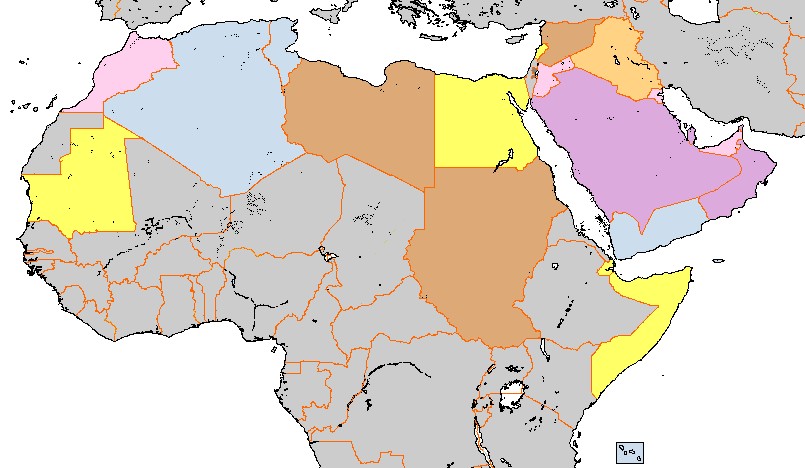by Graham E. Fuller
In the last blog I talked about four key historical reasons for Muslim resistance to the West—apart from the well-known factors of imperialism, and regular western political and military intervention.
There is at least one more important characteristic of the Muslim world, distinguishing its political philosophy and outlook from that of the West. That is the level of political identity in Muslim political thinking: that level is arguably “higher” and broader than the modern western view of the nation-state. (Thanks to Muslim scholar Robert D. Crane who recently reminded me of this factor; Crane is a prolific writer on Islam and director of the Center for Policy Research, located in Santa Fe and Washington.)
All peoples of course maintain several levels of identity: in simplest terms we all have local, regional, clan, national (passport), ethnic, and cultural/religious identities—apart from economic, professional, gender, etc. Problematically, these identities coincide with state borders only at the national (passport) level. Other identities may be part of a minority identity within the state, or a supra-ethnic/religious identity that spills over national borders. All of this of course provides plentiful raw material for conflict. And it is often the cultural/religious identity in most countries that is psychologically the most meaningful for people, regardless of state affiliation.
The Muslim level of political consciousness here contrasts sharply with the western ideas of nation-state. The nation-state that gradually appeared in the West some 250 years ago. It was in principle based on ethnic unity of a region—Germans, French, Italians, Hungarians, etc. Loyalty to the state, based on that ethnic/linguistic identity, eventually took on supreme political and moral value. (Never mind that in most of these European nation-states, many smaller minorities had been crushed over time, forced to abandon minority identity and to adopt the official nation-state identity; we see roots of this still today in surviving separatist movements such as among Welsh, Scots, Catalans, Basque, Sardinians, Flemish, etc.)
Thus even the concept of the western nation-state was born out of some degree of internal violence. Worse, the narrow and intense nationalist poisons of these nation-states created chauvinisms that ultimately brought us World War I and World War II. Indeed, after that last devastating war, Europe backed away from promoting the ideal of the nation-state concept in recognition of its toxic and dangerous nature; it sought instead to forge a new European identity—in which war would now be unthinkable.Yet Europe still teeters between local nation-state nationalisms and the idea of a greater European political and economic community; but by any standards the present is a major step forward over the past.
For multiple historical reasons, Muslims never really bought into the nation-state idea (modern Turkey and Iran are partial exceptions.) Arabs, particularly in modern times, came to believe that some form of Arab unity—political, cultural or both—represented a major ideal, transcending the petty and often artificial colonially-imposed borders among modern Arab states. That is one reason why Arab politics invariably still “interfere” in the affairs of other Arab states; the modern borders, or sovereignty, of individual Arab states are not so sacrosanct. What are in principle seen as “internal” Arab state affairs also impact the affairs and interests of other Arab states. The point is that the concept of a union of Arab states is still seen by many Arabs as a high political ideal, something somehow “meant to be”; divisions among them are deemed artificial and unworthy. And we are talking about some twenty countries involved here. Even if pan-Arab unity is not embraced by all Arabs, there are few who don’t find some level of emotional appeal in the idea—as a principle.
Of course the ideal is one thing, actual implementation requires skill, leadership, and wise statesmanship. Those qualities have been largely lacking in the Arab world up to now—not least due to the general absence of democratic process (for which the West bears at least a portion of the blame in its routine support of dictators.) The West is furthermore uncomfortable with the idea of Arab unity since it represents a potential source of alternative regional political power.
In short, should not at least the aspiration to higher forms of political and cultural unity be perceived as a “progressive” goal in the world? Is it not encouraging that Arabs should aspire to greater unity at a time when most peoples of the world seem to aspire to separatism? When even Europe is still struggling with the concept?
“Pan-Arabism” of course, as a concept can create issues of the status of non-Arab minorities within those states. But is this not the same problem of ethnic minorities that Europe itself struggles with to this day in its “nation-states?”
The West of course has long mocked Arab yearnings towards “Arab unity,” partly because efforts to bring it about in the past have taken place under incompetent and flawed Arab autocratic leadership. If we think about it, in this era in which separatist mini-nationalisms such as in the Balkans have been destroying the fabric of societies, is not the grander concept of an Arab world more in keeping with the spirit of the times—in trying to move away from narrower and petty local nationalisms and tribalisms towards grander political and cultural unions?
But how about non-Arab Muslims? Islam in fact has never approved of the concept of nationalism; it views it as retrograde, “tribal,” narrow in vision, trapped in potential chauvinism and thus a source of petty conflict—none of which is part of God’s order. Thus many Arabs of Islamist outlook reject even Arab nationalism as “tribal” and retrograde, as setting Arab against Persian against Turk and Indonesian—failing to aspire to higher levels of Muslim unity, the values of the umma.
Muslims may never achieve any kind of genuine political union as an umma, nor need it do so, but it is a political and cultural aspiration with emotional appeal to large numbers of Muslims. Is it not desirable that the various Muslim states of the umma work towards closer bonds among themselves, as Europe itself strives in that direction? (Yes, the umma is founded on a religious basis which poses potential problems to non-Muslims, but then in the eyes of many Europeans the European Union is founded on an essentially Christian cultural identity—part of the problems of integration in the EU today.)
Thus the Muslim world differs markedly from the West in this respect. The concept of the umma remains basically contradictory to the western nation-state concept (although the West tried to impose the nation-state upon the rest of the world, even as it was destroying Europe itself.) Is it not more progressive that Muslims should yearn for a greater sense of solidarity and unity among themselves—rather than fighting to break away and divide, as European and other global ethnic minorities try to do?
A religious (Islamic) foundation of unity does not solve all problems. We can point out separatist trends within Muslim states themselves—among the biggest, Kurds in Turkey, Iran and Iraq; Berbers in Morocco and Algeria. But even here, the Kurds and Berbers are not reacting against unity under Islam. They are resisting the verywestern nation-state ideas implanted in modern times within these states—in which Kurds are being threatened by Turkish or Iranian nationalism, Berbers by Algerian nationalism, not by Islam which should function as an umbrella order.
Romans and Mongols, among others, shared the same grand vision of unity, albeit not on a religious basis. Westerners may now need to rethink their prejudices that concepts of an umma, a Muslim world, or an Arab world, are backward or retrogressive. In reality they just might be ultimately progressive if they can be coupled with good governance for a change. With time Muslim statesmen should gain the governing skills that may help to bring the concept closer to fruition. Lack of good governance is quite a different problem than overcoming the narrowly defined nation-state.
photo: members of the Arab League
This article was originally published by Graham E. Fuller and was reprinted here with permission. Copyright Graham E. Fuller. These issues are discussed at some length in Chapter Four of his recent book, Turkey and the Arab Spring: Leadership in the Middle East






It is more correct to Arabs not Muslims since many other Muslim countries not only Iran and Turkey can be thought as a real nation-states
It is important to note the utmost importance given in Islam to the value of words. While Christianity relies on the person of Jesus-Christ, Islam relies on a book of words.
What unites Arabs Moslems is the language and the Arab culture. Iranians, Turks, Indonesians do not speak or read Arabic and Atarturk has even eliminated the arab script from the turkish language. These countries have a “translated” and often adapted access to Islam sacred books and culture. While Moslems, culturally they are very different and do not identify with Arabs that they often despise.
While a common language creates a strong bound, it often encourages the illusion of unity beyond borders. That’s the illusion Arabs have been living.
To unite these countries they need a leader that knows how to appeal to the Arabs with his words. That’s what Abdel Nasser was. But he was fought by the West that saw in him a unifier that would threat the western interests.
Since Nasser, there has been no been any Arab leader that could bring these countries in sync.
Desillusioned, many Moslem Arabs who thought they would find unity in Islam, are now faced with worse divisions, some inherent to Islam and some encouraged by the West. Political Islam has failed in the Arab speaking countries.
It is possible that after all these failures of Arab nationalism and Political Islam, Arabs will regrouped around their leader and develop a stronger nationalism that will remain on the defensive. We already see that in Egypt and in Tunisia. Many Arab countries will follow once there is a consensus that because of the numerous and sometimes conflicting interpretation of the teachings of Islam, it can never be a unifying factor in countries where there are a large variety of sects and religions.
That’s probably the lesson to take from the death and misery this quest for ‘unification’ of the “umma” has brought without a result: Look somewhere else away from Islam.